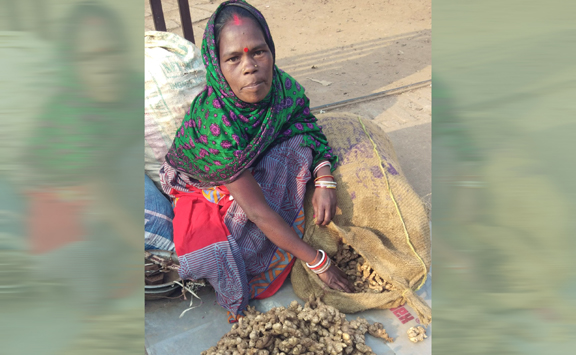Keonjhar: Demand for ginger of indigenous variety is growing in the market because of its medicinal properties. Tea prepared with a dash of such ginger has a high demand in the market.
Given the demand of ginger, Bhuyan tribals have been cultivating the indigenous variety of ginger in recent years at Bayakumutia village under Bansapal block of Keonjhar without much support from the agriculture department. Importantly, this farming has made them self-sufficient.
They say, they are earning good enough from this farming to meet their family expenses.
Jasoda Dhangda, a tribal woman of the village said, ”Earlier, we have been cultivating ginger for our own domestic consumption. We have grown it on more areas this year. It has a good market. After harvest we are selling it and earning enough.”
Last year, the tribal farmers had set aside some ginger as seeds and have sown them in the field. “This farming starts during Raja festival and harvest happens after Makar festival,” she added.
Women of Bhuyan tribe play a crucial role in ginger cultivation in the area. Apart from extending a helping hand in the farming, they sell it in the market. However, many farmers alleged that they do not get right price of the organically grown crop in the local market.
Another problem is lack of storage facility after harvest. In the absence of cold-stores in the hilly region, a major part of the crops rots when they remain unsold. A kilogram of ginger is sold for Rs 50 to Rs 60 while it is sold at Rs 80 to Rs 100 in the city markets.
According to Bhuyan and Juanga tribals, the hilly area of Bansapal is quite favourable for farming of ginger and turmeric, but lack of technical and financial support from the government is a hurdle to the growth of this farming.
They observed that if they are provided with right kind of support from the department, the ginger farming can be expanded in the area.
They pointed out that the advantage of ginger and turmeric farming is that it requires low water while cattle and elephants do not touch the crops. In most parts of Keonjhar, elephants damage crops, but they spare ginger and turmeric.
Ullash Nayak, a tribal farmer, said,” I had spent Rs 1,200 in the ginger farming and earned Rs 5000. If help is provided, I will take it up largely.”
All ginger farmers carry their crops in hired auto rickshaws to the market every day and sell it, said Dasri Dhangdi, another woman farmer.
PNN

